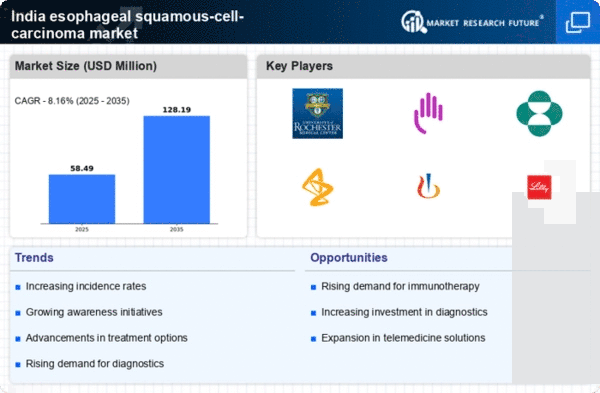Rising Healthcare Expenditure
The increase in healthcare expenditure in India is a significant driver of the esophageal squamous-cell-carcinoma market. As the country experiences economic growth, there is a corresponding rise in healthcare spending, which facilitates better access to cancer treatments and services. Reports indicate that healthcare expenditure in India is projected to reach approximately 4% of GDP by 2025. This increase allows for the procurement of advanced treatment modalities and technologies, enhancing the overall quality of care for patients with esophageal squamous-cell-carcinoma. Furthermore, as more individuals seek treatment, the market is likely to expand, driven by the demand for innovative therapies and comprehensive care solutions.
Government Initiatives and Funding
Government initiatives aimed at cancer control and funding for research are pivotal in influencing the esophageal squamous-cell-carcinoma market in India. The Indian government has launched various programs to enhance cancer awareness, prevention, and treatment accessibility. For example, the National Cancer Control Program focuses on early detection and treatment, which is essential for improving survival rates. Additionally, increased funding for research into esophageal cancer can lead to the development of novel therapies and treatment protocols. This financial support is likely to stimulate innovation within the market, encouraging pharmaceutical companies to invest in research and development. Consequently, these initiatives may lead to a more robust esophageal squamous-cell-carcinoma market, with improved treatment options for patients.
Increasing Prevalence of Risk Factors
The esophageal squamous-cell-carcinoma market in India is significantly influenced by the rising prevalence of risk factors such as tobacco use, alcohol consumption, and dietary habits. Studies indicate that approximately 50% of esophageal cancer cases in India are attributed to these lifestyle choices. The correlation between these risk factors and the incidence of esophageal squamous-cell-carcinoma suggests a growing need for targeted prevention and treatment strategies. As awareness of these risk factors increases, the demand for screening and early detection services is likely to rise, thereby driving the market. Furthermore, public health initiatives aimed at reducing tobacco and alcohol consumption may also contribute to a shift in the market dynamics, emphasizing the importance of addressing these risk factors in the context of the esophageal squamous-cell-carcinoma market.
Technological Innovations in Diagnostics
Technological advancements in diagnostic tools are playing a crucial role in shaping the esophageal squamous-cell-carcinoma market in India. Innovations such as endoscopic ultrasound, advanced imaging techniques, and molecular diagnostics are enhancing the accuracy of early detection. The introduction of these technologies has the potential to improve patient outcomes significantly, as early-stage detection is associated with higher survival rates. For instance, the use of minimally invasive techniques can lead to quicker diagnoses and treatment initiation, which is vital in managing this aggressive cancer type. As healthcare providers increasingly adopt these advanced diagnostic methods, the esophageal squamous-cell-carcinoma market is expected to experience growth driven by improved patient management and treatment planning.
Growing Patient Advocacy and Support Groups
The emergence of patient advocacy and support groups is increasingly impacting the esophageal squamous-cell-carcinoma market in India. These organizations play a vital role in raising awareness about the disease, providing education, and supporting patients and their families. By fostering a community of support, these groups encourage individuals to seek early diagnosis and treatment, which is crucial for improving outcomes. Additionally, they often collaborate with healthcare providers and policymakers to advocate for better access to care and funding for research. As the influence of these advocacy groups grows, they may drive demand for more effective treatment options and contribute to the overall development of the esophageal squamous-cell-carcinoma market.
















